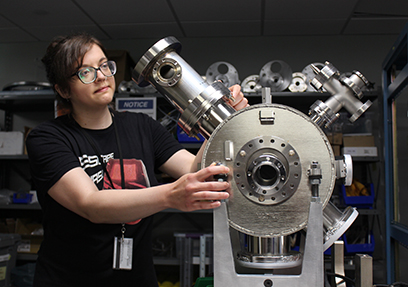Graduate Students
Seize the unique opportunity to do research at a national user facility located on the campus of a major research university.
What makes FRIB unique
- The strong interaction between the experimental and theoretical scientists and the frequent visitors and users of the facility creates an open and academically stimulating atmosphere.
- FRIB is widely recognized for its cutting-edge research in nuclear science, nuclear astrophysics, accelerator physics, and engineering. This is evidenced by the large number of publications in high-quality refereed journals and invited talks at national and international conferences.
- Most graduate students are financially supported with research assistantships when working on thesis projects. Exceptional students can be awarded an FRIB fellowship.
Explore new nuclear frontiers
 As the premier rare isotope facility in the United States, FRIB is a high national priority, as expressed in the recommendations in the Nuclear Science Advisory Committee’s (NSAC) A New Era of Discovery: The 2023 Long Range Plan for Nuclear Science. NSAC is a federally chartered advisory committee to the U.S. Department of Energy and National Science Foundation. The experimental and theoretical insights gained at FRIB will lead to a comprehensive description of nuclei, elucidate the origin of the elements in the cosmos, provide an understanding of matter in the crust of neutron stars, and establish the scientific foundation for applications of nuclear science to society.
As the premier rare isotope facility in the United States, FRIB is a high national priority, as expressed in the recommendations in the Nuclear Science Advisory Committee’s (NSAC) A New Era of Discovery: The 2023 Long Range Plan for Nuclear Science. NSAC is a federally chartered advisory committee to the U.S. Department of Energy and National Science Foundation. The experimental and theoretical insights gained at FRIB will lead to a comprehensive description of nuclei, elucidate the origin of the elements in the cosmos, provide an understanding of matter in the crust of neutron stars, and establish the scientific foundation for applications of nuclear science to society.
As a graduate student at FRIB, you have unmatched access to world-leading instrumentation, facilities, and expertise. You will also have access to world experts who frequently visit the laboratory and collaborate closely with local faculty. You’ll be engaged in all aspects of research to make meaningful contributions to your field of study.
Experimental science and nuclear theory
Graduate students in experimental nuclear science will be involved in all aspects of performing an experiment at FRIB:
- writing a proposal that will be reviewed by an external Program Advisory Committee;
- designing an experiment;
- setting up the hardware;
- writing data acquisition and analysis code;
- analyzing, simulating, and interpreting the results; and
- writing a manuscript for a peer-reviewed journal.
Similarly, theory students at FRIB will be involved in writing data acquisition and analysis code; analyzing, simulating, and interpreting the results; and writing a manuscript for a peer-reviewed journal.
Accelerator physics
Students in accelerator physics participate in the development of state-of-the-art technologies to create and manipulate beams of charged particles. Students greatly benefit from the in-house expertise and resources associated with running FRIB.
Feel welcomed and valued
Scientific users, students, and employees at the FRIB Laboratory share a common interest—to contribute to society through scientific discovery. Here, you can expect to be included and valued in a welcoming and respectful environment that advances excellence and fosters participation.
We are committed to fostering a safe and supportive work and research environment that values respect and personal integrity. Because of this commitment, the world’s best and brightest minds choose FRIB to make world-leading discoveries.
At FRIB, graduate students explore how protons and neutrons form atomic nuclei, investigating phenomena like clustering, weak binding, and nuclear deformation. With access to the world’s most advanced rare isotope facility, students study exotic nuclei and contribute to discoveries that address key questions in nuclear science.
Join FRIB’s cutting-edge research and help advance the understanding of nuclear structure.
At MSU and FRIB, students gain access to cutting-edge tools and expertise in nuclear astrophysics. Research at FRIB focuses on key cosmic phenomena, such as element synthesis, stellar explosions, and neutron stars. Ongoing observations from the James Webb Space Telescope, Rubin Observatory, LIGO, and neutrino experiments are expanding our understanding of the universe.
These advancements require scientists with strong backgrounds in nuclear astrophysics and rare isotopes, skills that can be developed through research at FRIB. Graduates acquire expertise in data analysis, computational modeling, and project management, preparing them for rewarding careers in academia, industry, and research.
At FRIB, graduate students have the chance to explore fundamental questions that go beyond the Standard Model of particle physics. With rare isotopes and cutting-edge tools, students can investigate unresolved issues such as: What are the masses of neutrinos, and how did they shape the universe? Are neutrinos their own antiparticles? Why is there more matter than antimatter?
FRIB’s unique research environment allows students to explore hidden interactions, broken symmetries, and other phenomena that could reveal new physics, advancing our understanding of the universe.
At FRIB, graduate students have access to groundbreaking research opportunities in nuclear science, using rare isotopes to advance fields like medicine, national security, and materials science.
FRIB’s capabilities support interdisciplinary studies, enabling students to explore applications in cancer treatment, isotope harvesting, forensic science, and more. FRIB’s novel isotope production method also places MSU at the forefront of radiochemistry and nuclear chemistry research.
With major contributions to the 2023 Nuclear Science Advisory Committee’s long-range plan, FRIB offers unparalleled resources for student-driven discovery and innovation.

